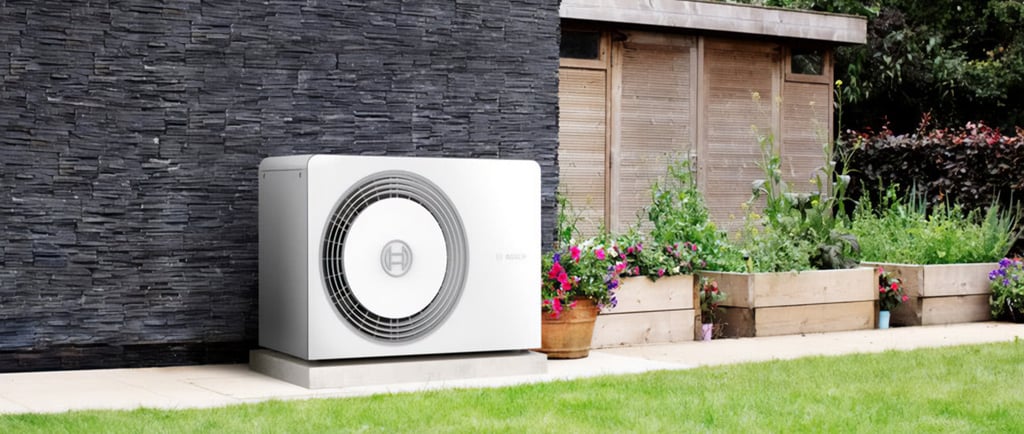Heat Pumps: Efficient and Sustainable Heating Solutions for Your Home
"Heat pumps provide a sustainable and energy-efficient solution for heating and cooling buildings. With this technology, you can not only reduce your energy costs but also contribute to environmental protection by using renewable energy sources."


Heat Pumps: The Sustainable Heating Solution for the Future
In times of rising energy prices and increasing environmental awareness, more and more people are looking for efficient and eco-friendly heating solutions. One of the most promising technologies is heat pumps. They offer not only a cost-effective way to heat homes but also make a significant contribution to climate protection. In this blog post, we will take a look at what heat pumps are, how they work, and why they are a forward-thinking solution for energy supply.
What is a Heat Pump?
A heat pump is a device that extracts thermal energy from the environment (air, water, or ground) and uses it to heat or cool buildings. Unlike traditional heating systems that burn fossil fuels, heat pumps use renewable energy sources and operate very efficiently.
The operation of a heat pump is similar to that of a refrigerator, but in reverse: instead of releasing heat to the outside, the heat pump extracts heat from the environment and transfers it into the house. It can also function as an air conditioner by removing heat from the building during the summer months and releasing it outside.
How Does a Heat Pump Work?
A heat pump consists of four main components: the evaporator, the compressor, the condenser, and the expansion valve. The process takes place in several steps:
Heat Extraction: The heat pump extracts heat from the outdoor air, ground, or water. This heat is absorbed by a refrigerant.
Compression: The refrigerant is compressed by a compressor, increasing its temperature.
Heat Release: The hot refrigerant is then directed to the condenser, where it releases its heat to the home's heating system.
Expansion: The cooled refrigerant passes through the expansion valve and returns to its original state to restart the process.
Advantages of Heat Pumps
Energy Efficiency: Heat pumps are highly efficient because they can produce multiple units of heat for each unit of electricity consumed. The ratio of heat generated to electricity consumed is described by the "Coefficient of Performance" (COP), which for modern heat pumps usually ranges from 3 to 5. This means that for every kilowatt-hour of electricity used, up to five kilowatt-hours of heat can be generated.
Renewable Energy Sources: Heat pumps use natural heat from the environment, making them a form of renewable energy. They help reduce CO2 emissions and thus support climate protection.
Versatility: Heat pumps can be used for both heating and cooling. This makes them an all-year-round solution for a home's energy needs.
Low Operating Costs: While initial installation costs can be relatively high, heat pumps significantly lower heating costs since they use less energy than traditional heating systems.
Longevity: Heat pumps have a long lifespan and require minimal maintenance if properly serviced
Types of Heat Pumps
There are several types of heat pumps, each utilizing different energy sources:
Air-to-Water Heat Pump: This type of heat pump extracts heat from the outside air and transfers it to the home's heating system. It is particularly easy to install and is well-suited for residential buildings.
Ground Source Heat Pump (Geothermal Heat Pump): This heat pump uses the constant temperature of the ground to extract heat. Pipes are installed in the ground through which a refrigerant circulates. It is highly efficient but requires more space for installation.
Water-to-Water Heat Pump: This type of heat pump extracts heat from groundwater or a nearby water source. It is very efficient, but its installation is more complex and requires the availability of suitable water.
Heat Pumps and Government Subsidies
The purchase of a heat pump may initially come with higher costs, but many countries and regions offer subsidy programs or tax incentives to support the transition to sustainable heating technologies. In Germany, for example, there are numerous subsidy opportunities that can make the installation of a heat pump more affordable.
Conclusion: Heat Pumps as a Future-Proof Heating Solution
Heat pumps offer an efficient, eco-friendly, and cost-saving solution for heating and cooling buildings. They help reduce energy consumption and CO2 emissions, making them a key component of a sustainable energy future. If you're looking for a long-term, environmentally friendly heating solution, a heat pump could be the ideal choice for your home.
For companies like Solpalux, which focus on sustainable energy solutions, heat pumps represent an excellent opportunity to further promote the transition to renewable energy.
